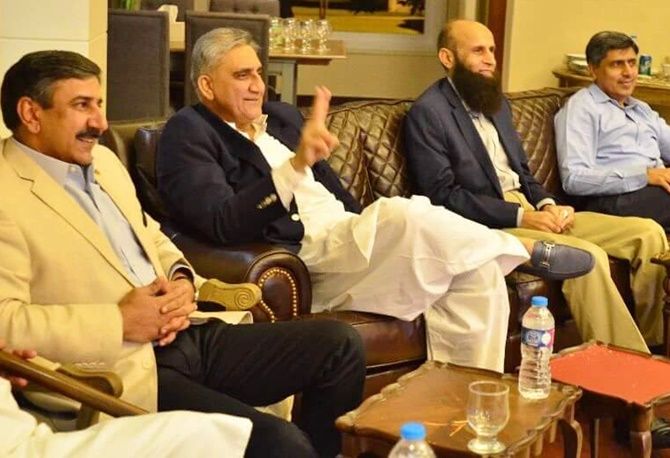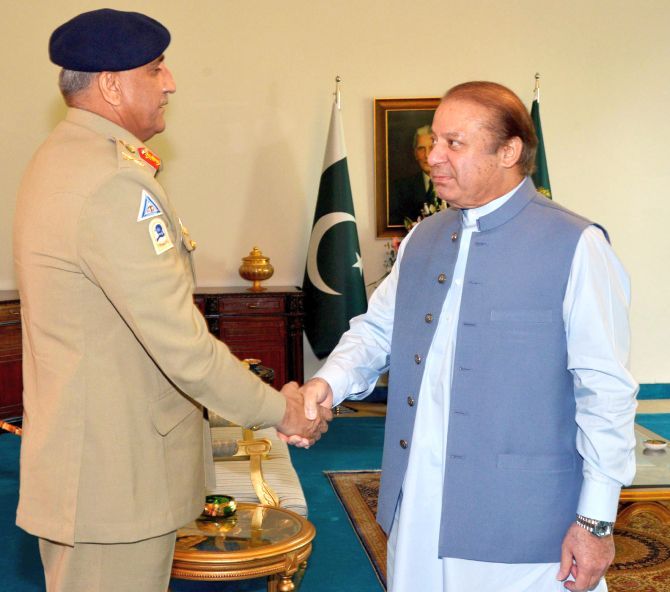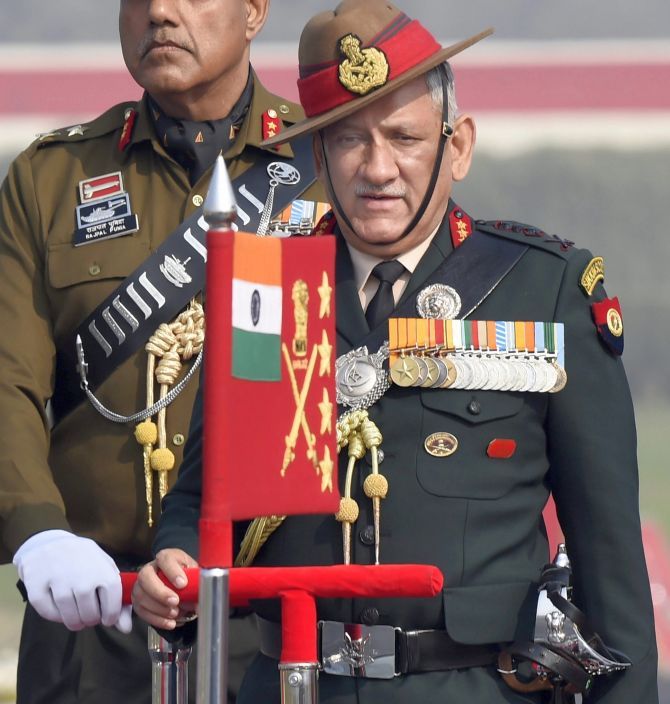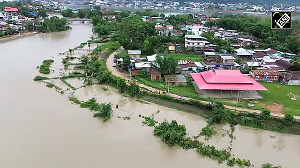'Over the last year, Bajwa has created the environment to support bold moves on India. The ball is in India's court,' a senior Pakistan military officer tells Ajai Shukla.

IMAGE: Pakistan army chief General Qamar Javed Bajwa flashes the V sign after the Pakistan cricket team defeated India in the Champions Trophy final.
Sources close to the Pakistani military say New Delhi is missing an opportunity to engage Islamabad in dialogue that would have the full backing of Pakistan's powerful army chief, General Qamar Javed Bajwa.
The sources say India is under-reading two unambiguously positive signals that Bajwa has choreographed in recent months.
Instead, New Delhi, especially the Indian Army, is focusing on tactical aspects like ceasefire violations on the Line of Control and infiltration of militants, which have little to do with strategic issues like dialogue resumption.
Restarting dialogue, these sources point out, would automatically calm the LoC and reduce armed militancy in Kashmir.
A senior Pakistani officer with direct knowledge of his army chief's thinking says: "The Pakistan army would be willing to re-start negotiations around the so-called Four-Point Formula that was negotiated (between the representatives of then prime minister Manmohan Singh and then president Pervez Musharraf) in 2005-07."
The Four-Point Formula, which looked beyond both sides' claims to all of pre-1947 Jammu and Kashmir, ruled out redrawing borders or amending constitutions.
Instead, it sought to make the existing boundary irrelevant by enabling commerce and contacts between Kashmiris on both sides of the LoC.
Across India's political spectrum, the Four-Point Formula, or a variation of it, might be the only acceptable solution to the Kashmir dispute.
On December 19, Bajwa first signalled that the Pakistan army did not oppose dialogue with India. Briefing a joint sitting of both houses of Pakistan's parliament on 'national security affairs', he conveyed the point that he would support any civilian government initiative on opening talks with India.
'You (parliament) will devise all policies including defence and foreign affairs, whereas we (the army) will abide by (the policies),' said Bajwa, according to the Pakistani newspaper Dawn, which quoted a parliamentarian who attended the briefing.
Bajwa was accompanied to parliament by a senior team of generals, signalling the army's resolve to crack down on terrorist groups.
These included Inter-Services Intelligence chief, Lieutenant General Naveed Mukhtar; the army's public relations chief, Major General Asif Ghafoor; and military operations chief, Major General Sahir Shamshad Mirza, who gave a detailed briefing on the anti-terror Operation Radd-ul-Fasaad (End of Discord) launched last February.
While the focus was on 'anti-Pakistan'groups like the Tehrik-e-Taliban Pakistan, with little emphasis on 'strategic assets' like the Lashkar-e-Tayiba that function as deniable instruments of the Pakistan army, Bajwa had backed the arrest of LeT chief Muhammed Saeed last January and his detention until a court-ordered release in November.
It is rare for Pakistan's army chief to report to the elected legislature. The last time it happened was in 2011 when General Ashfaq Kayani and his ISI chief, Lieutenant General Shuja Pasha, briefed parliament on the killing of Osama bin Laden in Abbottabad by US special forces who humiliatingly penetrated deep into Pakistani territory to carry out a unilateral operation.

IMAGE: Then Pakistan prime minister Nawaz Sharif, right, with Pakistan army chief General Qamar Javed Bajwa.
Pakistani sources say Bajwa's visit to parliament was also intended to telegraph the message that the confrontation with the ruling Pakistan Muslim League (Nawaz), was over with the ouster of former prime minister Nawaz Sharif in July after the supreme court banned him from holding public office for life.
Bajwa was signalling that the army fully backed Sharif's successor, Shahid Khaqan Abbasi, and that civil-military relations were again on an even keel.
Bajwa had already signalled an end to confrontation with the PML(N). This was done on September 28, with the posting of the trusted Lieutenant General Aamer Riaz as commander of the Lahore-based 4 Corps.
Riaz also happens to be close to Shehbaz Sharif, Nawaz Sharif's brother, who is the Lahore-based chief minister of Punjab.
With Riaz as the interface between the PML(N) and the army, political confrontation between the two was clearly over.
Since November 2016, when Nawaz Sharif appointed him chief of army staff, Bajwa has, more unambiguously than any army chief since Musharraf after 2003, signalled that the Pakistan army would back a peace process with India.
As I reported soon after Bajwa's appointment, he told the Pakistan army that the country's interests lay in ending confrontation with India, without compromising Pakistan's self-respect.
This was a bold move, coming soon after India's 'surgical strikes' in September 2016 on Pakistani targets across the LoC.
Pakistan army folklore recounts a visit by the newly appointed chief to a forward LoC post, where a unit commander, wanting to appear aggressive and effective, described to Bajwa what mayhem he had caused in the Indian Army posts in front of him.
After hearing him out, Bajwa quietly asked: 'So have you brought azaadi (independence) to Kashmir?'
A pragmatist with both feet on the ground, Bajwa is aware that talk of Kashmir's azaadi is more political than practical.
He has noted the signs posted in shops in Muzaffarabad, the bustling capital of Pakistan occupied Kashmir, which read: 'No credit, until Kashmiri azaadi'. Clearly no shopkeeper believes azaadi is nigh.
Bajwa moved to remove his army's Kashmir obsession, replacing a hawkish ISI and public relations chiefs with more moderate officers.
In the 14 months since, he has appointed corps commanders who shared his views, easing out hardliners appointed by his predecessor, General Raheel Sharif.
Sharif's appointment to command the Saudi Arabia-inspired, 39-nation Islamic Military Alliance to Fight Terrorism has allowed Bajwa space to shape the all-important caucus of corps commanders in his own image.
"Over the last year, Bajwa has created the environment to support bold moves on India. The ball is in India's court," says a senior Pakistan military officer.

IMAGE: Army Chief General Bipin Rawat inspects the guard of honour during the Army Day parade in New Delhi, January 15, 2018. Photograph: Kamal Singh/PTI Photo
New Delhi has either missed Bajwa's signals, or else has decided that, at least for now, confrontation with Pakistan rather than dialogue is the way forward.
Pakistani sources point out that India's ministry of external affairs has conditionally welcomed Bajwa's reported comments in parliament supporting dialogue and good relations with India.
In contrast, Indian army chief, General Bipin Rawat, has answered Bajwa's conciliation with hardline statements.
On December 22, at the conclusion of a large military exercise in the Thar desert, Rawat underlined Pakistan's continuing support for terrorists (in J&K) to argue that it did not really want peace.
'Only (if Pakistan stops supporting terrorists) can we say that peace talks should take place,' he told reporters in Barmer.
Unlike a Pakistani army chief, whose statements are as much political as military, Rawat's outlook is tactical, his ire fanned by Pakistan's continuing aggression on the LoC -- through ceasefire violations and supporting militant infiltration into Kashmir.
Apparently undeterred by the Indian Army's 'surgical strikes' of September 2016, there have been a reported 860 ceasefire violations in 2017, thrice as many as the year before. Infiltration has climbed in proportion.
This has caused Rawat to actually concede -- the first time an army chief has done so -- that India was violating the ceasefire to punish Pakistani posts that support infiltration.
On January 12, he stated: 'Earlier, we were targeting only infiltrating militants. But these extremists are disposable commodities for Pakistan. Instead, the pain has to be felt by the Pakistan armed forces for supporting infiltration. So we have started targeting his (Pakistan's) posts and I can assure you that, in these exchanges of fire, he has suffered three-four times the casualties. That is why we get repeated requests from Pakistan to take the ceasefire back to 2003 levels.'
In a snub to the Pakistan army, Rawat said: 'If we see a drop in infiltration along the LoC, we are willing to call for a ceasefire, but not until (then). This is in full coordination with the government.'
Three days later, on January 15, Rawat stated, 'The Pakistan army is helping infiltrators; if they provoke us further, we will take stronger action.'
During this same period, India reportedly spurned a Pakistani request for the two directors general of military operations to meet and discuss de-escalation on the LoC.
While the DGMOs speak on the telephone every week, a meeting is a special event.
One last took place at Wagah in December 2013, and succeeded in de-escalating tension that had flared on the LoC after Pakistani troops killed seven Indian soldiers and mutilated the bodies of two.
With official dialogue closed, a back-channel dialogue track between the two national security advisors -- Ajit Doval and Nasir Khan Janjua -- is apparently the only real communication channel between the two countries.
The MEA has portrayed this as a mechanism to hold Pakistan responsible for terrorism, but there are few buyers for this explanation.
Pakistani military officers tell me that Bajwa's presence offers a rare opportunity for a regular political dialogue that has the full support of the army.
"Bajwa is due to retire in November 2019, which provides an assured 22-month window. It is impossible to tell who will succeed him or whether the next army chief would have the same mindset."
New Delhi would remember that Kayani, who succeeded Musharraf in 2007, quickly scuttled his predecessor's Four-Point Formula, bringing to naught the most promising peace initiative in the history of Indo-Pak relations and taking both countries back to the start line.












